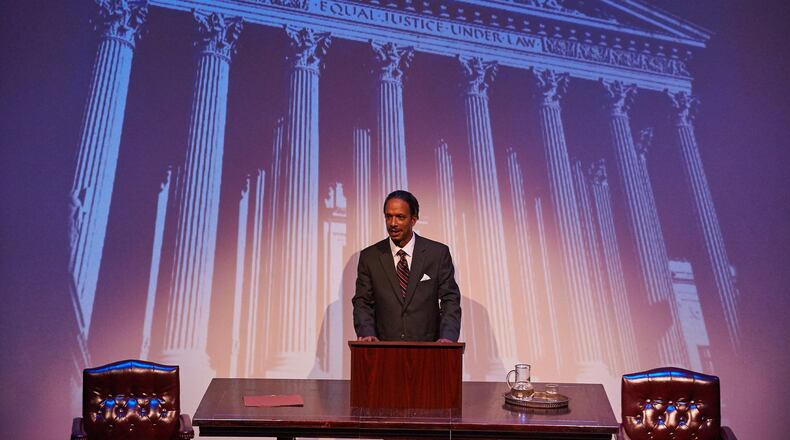THEATER REVIEW
“Thurgood”
Grade: A-
Through Oct. 16. 7:30 p.m. Wednesdays-Saturdays; 2:30 p.m. Saturdays-Sundays. $20-$50. Theatrical Outfit, 84 Luckie St. N.W. Atlanta. 678-528-1500, theatricaloutfit.org.
Bottom line: Pleases the court.
He was against capital punishment and rampant gun use.
Never mind that he came close to getting lynched as a young lawyer working for the NAACP in the Deep South. And that he saw black men subjected to unending violence at the hands of bigoted Baltimore police officers.
The law was his weapon, and he knew how to use it.
For 50 years, Thurgood Marshall, the great-grandson of a slave, used the legal system as a way of codifying social justice. In 1954, he argued, and won, Brown v. Board of Education, one of the most important court cases of the 20th century, before the U.S. Supreme Court. In 1967, he was named to that court by President Lyndon B. Johnson, making him the first African-American Supreme Court justice.
This larger-than-life man, former classmate of Langston Hughes, and liberal icon is the subject of “Thurgood,” a one-man biographical play that is getting a fine treatment at Theatrical Outfit downtown.
Directed by Eric J. Little ("Fetch Clay, Make Man") and starring Geoffrey D. Williams, "Thurgood" is a wonderfully entertaining history lesson and a fine 90-minute investment of your time.
Set at Howard University Law School — Marshall’s alma mater, but only because the University of Maryland wouldn’t let him in — George Stevens Jr.’s play imagines the justice in his final years: a creaky old man who has been invited to speak on the Washington, D.C., campus where he learned the law. It then moves back and forth in time.
The set is handsomely designed by R. Paul Thomason: a stately Howard lectern with an image of the Supreme Court building facade projected onto a screen. “Equal Justice Under Law” is writ large on the marble monument, as if to underscore the hypocrisy of America, from the Founding Fathers to the present day.
As Marshall tells it, he was born into a long line of people with curious names (maternal grandfather: Isaiah Olive Branch; paternal grandfather: Thoroughgood, a name he inherited but later changed because he tired of writing it) and extreme stubbornness.
The latter trait made him a damn fine lawyer, dogged and determined, at a time when America had precious few black attorneys.
When he argued his most famous case before the Supreme Court, he was interrupted by the nine white justices a Trumplike 43 times. He would not be bullied. And he wasn’t shy about challenging authority: He told LBJ thanks for the Supreme Court appointment but that he’d never be his puppet and instructed President Richard Nixon to back off when he inquired about his health. (He retired in 1991, a good 17 years after Nixon resigned in disgrace.)
One caveat with the play: It spends so much time depicting Marshall as a giant that it often fails to show his private side. We see how he is broken when his first wife dies of cancer. (He didn’t know she was sick until the 11th hour.) But mostly we get politics.
What must be said here is that Williams is excellent.
Changing in and out of costume designer Paula Renee’s coat rack of jackets to signal changes in time and character, he’s a bit of a creaky caricature as the senior Marshall, but slips nicely into the role of the younger man — as well as the men who influenced him (father, grandfathers, mentors) and the men who challenged him (especially John W. Davis, who argued against him in Brown v. Board of Education). His imitation of the sultry-voiced Davis is highly amusing, but his take on Texan LBJ falls flat.
By many accounts (including this play), Marshall was funny, and he loved women and booze. One of the choicest moments is when Williams describes watching a pornography tape for a famous case. Pregnant pause. Followed by impish grin. “That was a fun assignment,” Marshall says waggishly.
So was reviewing this play.
About the Author
Keep Reading
The Latest
Featured



